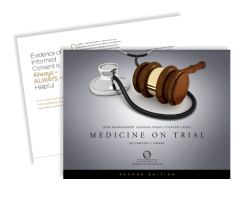In his most recent medical malpractice case study, CAP’s General Counsel Gordon Ownby analyzes a lawsuit against an internist who was alleged to have improperly prescribed Durezol to his patient. Every month Mr. Ownby provides commentary on a real-life litigated case for his monthly column “Case of the Month.” Read more than 80 case studies in his popular book, Medicine on Trial, Second Edition.

Download Medicine on Trail, Second Edition ebook
To receive a copy of the full study, please enter your email address below
Physicians are hard-wired to help their patients. But in doing so, there may come a time when “tough love” is required.
A 53-year-old telecommunications analyst began treating with Dr. I, an internist, and gave a history of allergies, skin concerns, and pterygium surgery 22 years earlier. Because of the patient’s complaints to Dr. I regarding his eyes, Dr. I referred him to an ophthalmologist.
The ophthalmologist diagnosed recurrent pterygium in the right eye and performed pterygium surgery two months later. The ophthalmologist prescribed Durezol eye drops post-surgery and issued a refill on a return visit seven weeks after surgery. That prescription included instructions for tapering after one week and discontinuing the anti-inflammatory steroid two weeks thereafter.
On a visit to Dr. I two months post-surgery, the patient complained of chronic ear pain and requested a referral to an ENT.
Four months after his eye surgery, the patient visited Dr. I complaining of pressure in his eyes and pain from the surgery. The patient told Dr. I that he could not get in to see his ophthalmologist because of insurance issues. He told Dr. I that the Durezol worked very well for the pain while non-steroidal anti-inflammatory medications did not. He asked Dr. I for a refill of Durezol to use until he could see his ophthalmologist again. Dr. I did an eye examination and assessed bilateral ocular pain and conjunctivitis. Dr. I charted that he explained the risks and benefits of ophthalmic corticosteroids. Dr. I issued a one-week prescription for Durezol and requested the patient obtain his ophthalmologist’s records for him.
Seven weeks later, the patient returned to Dr. I complaining of a right earache and seeking a Durezol refill. The patient reported he was unhappy with his ophthalmologist and was seeking a new one whom he would visit once his insurance changed. On examination, Dr. I noted a slight increase of vascularity of conjunctiva in both eyes but no growths, lesions, ptosis, or discharge. He prescribed Cefdinir for the earache, a Medrol pack, and Durezol. Dr. I noted: “Pt. requesting refill of Durezol eye drops for pain – lost previous bottle. [Pt] says this is the only thing that has ever helped his eye inflammation. Promises he will get to ophthalmology ASAP for IOP monitoring and will only use the medication for one week maximum.” Dr. I noted the patient was still aware and accepted the risks of long-term use of the Durezol.
Early the next year, the patient saw Dr. I for throat and right ear pain and reported he had been seen by an ophthalmologist and that he was still working on getting records sent. Dr. I charted a normal eye exam, noted a likely viral URI, and advised the gentleman to follow up with an ENT for his ear pain and to continue the workup of his eye discomfort with the ophthalmologist. The patient requested another Medrol pack, which Dr. I prescribed after discussing the risks and benefits.
Several months later (at approximately 11 months post-surgery), the patient again visited Dr. I, who diagnosed otitis media in the right ear and pterygium of the eye. Dr. I gave the patient Cefdinir and advised him to follow up with an ENT ASAP. He also told the patient to follow up with an ophthalmologist ASAP for eye discomfort and to return to him in one week for a recheck. Dr. I prescribed another Medrol pack after discussing risks and benefits.
On the patient’s return visit a week later, Dr. I gave the patient a prescription of Durezol with two refills.
Nine weeks later, the patient was examined by his original ophthalmologist, who diagnosed steroid-induced glaucoma in the right eye.
On a return visit to Dr. I three weeks hence for a possible rotator cuff injury and an ear recheck, the patient reported to Dr. I that a new ophthalmologist told him he may have optic nerve damage to his right eye or glaucoma. Dr. I’s plan was to get the records from the patient’s former and current ophthalmologists. In noting “no more oral or ophthalmic corticosteroids,” Dr. I referred the patient to physical therapy for the shoulder and to an ENT for chronic ear pain. He directed the patient to return to the office in two weeks for a recheck.
Later that year, Dr. I cleared the patient for cataract surgery. He still did not have records from the patient’s ophthalmologists.
In a subsequent lawsuit against Dr. I, the gentleman alleged that Dr. I improperly prescribed Durezol, causing optic nerve damage and glaucoma and necessitating additional future treatment. The lawsuit resolved informally.
Internists may find themselves drawn into the medical care being conducted by specialists. Coordination with those specialists is important and in the case of a medication with which the internist may not be fully familiar, insistence that the patient get refills only from the original prescribing physician may be the best way to help the patient overall.
Gordon Ownby is CAP’s General Counsel. Questions or comments related to “Case of the Month” should be directed to gownby@CAPphysicians.com.